With oil prices at a sustained low, you might wonder why do my award tickets incur so many fees?
Carriers got wise to the fact that they could no longer tack on exorbitant “fuel surcharges” and avoid the scrutiny of regulators when the price of oil dropped by more than 50%. Why a separate fuel surcharge but not a separate labor charge, catering change, and cleaning charge? After all, isn’t fuel just one part of the cost of doing business? Fuel costs have not been volatile in years.
But rather than just eliminate the fuel surcharge, carriers simply renamed it to “carrier imposed fees” or “carrier surcharge”.
What is a carrier imposed fee? Well, we don’t know. It appears as “YQ” in the fare breakdown but the contents of the “carrier imposed fee” remain shrouded in mystery. Ask a reservations agent what this is and they will invariably tell you “fuel surcharge”, underscoring the questionable nature of these fees. Practically, it is a way for airlines to quickly change flight pricing without re-filing fares.
But even if we don’t know exactly what a carrier imposed fee really is, we do know it in intended for: revenue. It has nothing to do with fuel. Carriers promise you “free” award tickets with your miles, but redeem on British Airways, Lufthansa, or Virgin Atlantic (just to name three) and you’re met with several hundred dollars – sometimes over $1,000 – in additional fees. By classifying this as a “fee” rather than as part of the ticket price, airlines can claim with a straight face that you are getting a free ticket and just paying taxes/fees. But don’t be fooled: there is nothing “free” about paying $1,100 out of pocket for the privilege of redeeming your miles to fly from New York to London.
And how do we know these aren’t really for fuel? Because sometimes when you travel longer distances, you pay significantly less in fees.
The Smoking Gun
Take this example with the following Lufthansa itineraries using Aeroplan—

Fly from LA to Frankfurt and the taxes/fees run. Of that, 606.80CAD is a carrier surcharge.
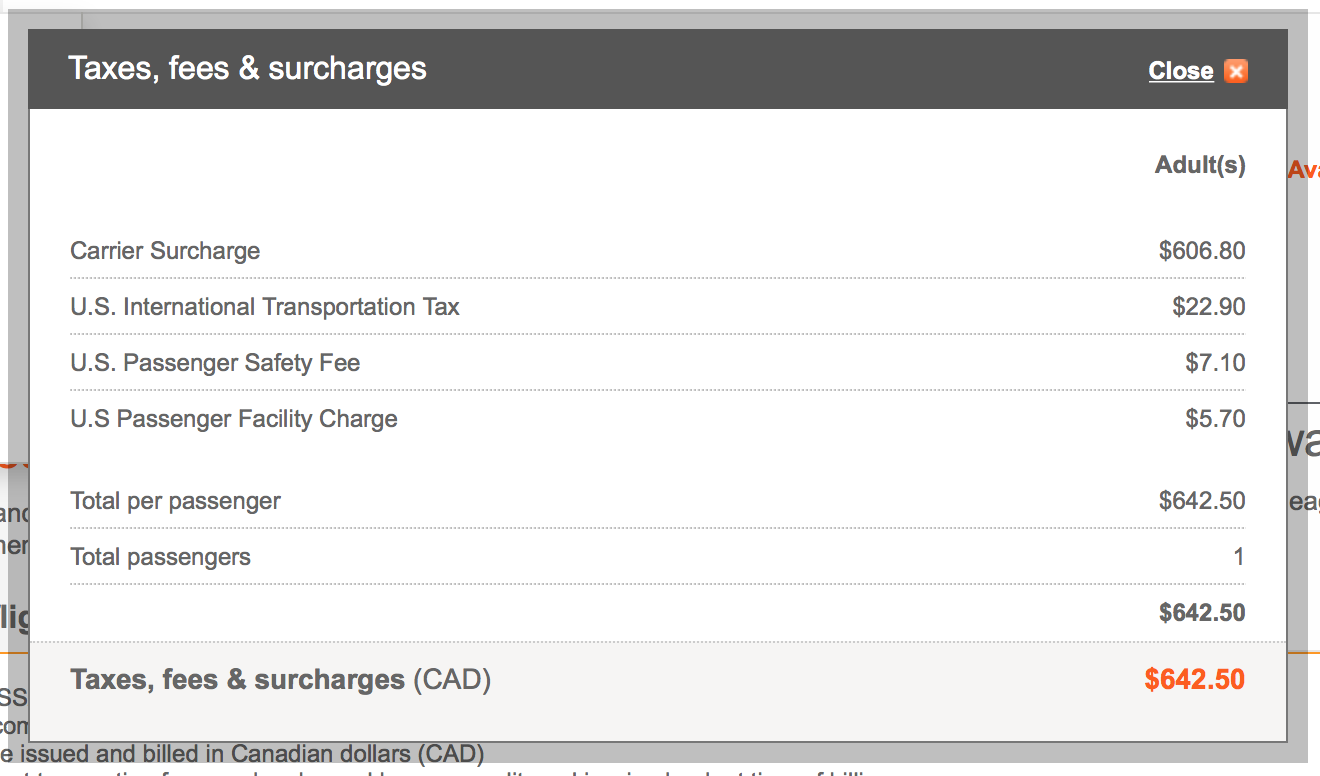
But fly from LA to Frankfurt on the IDENTICAL FLIGHT and connect to Amman and look what happens to the carrier surcharge…
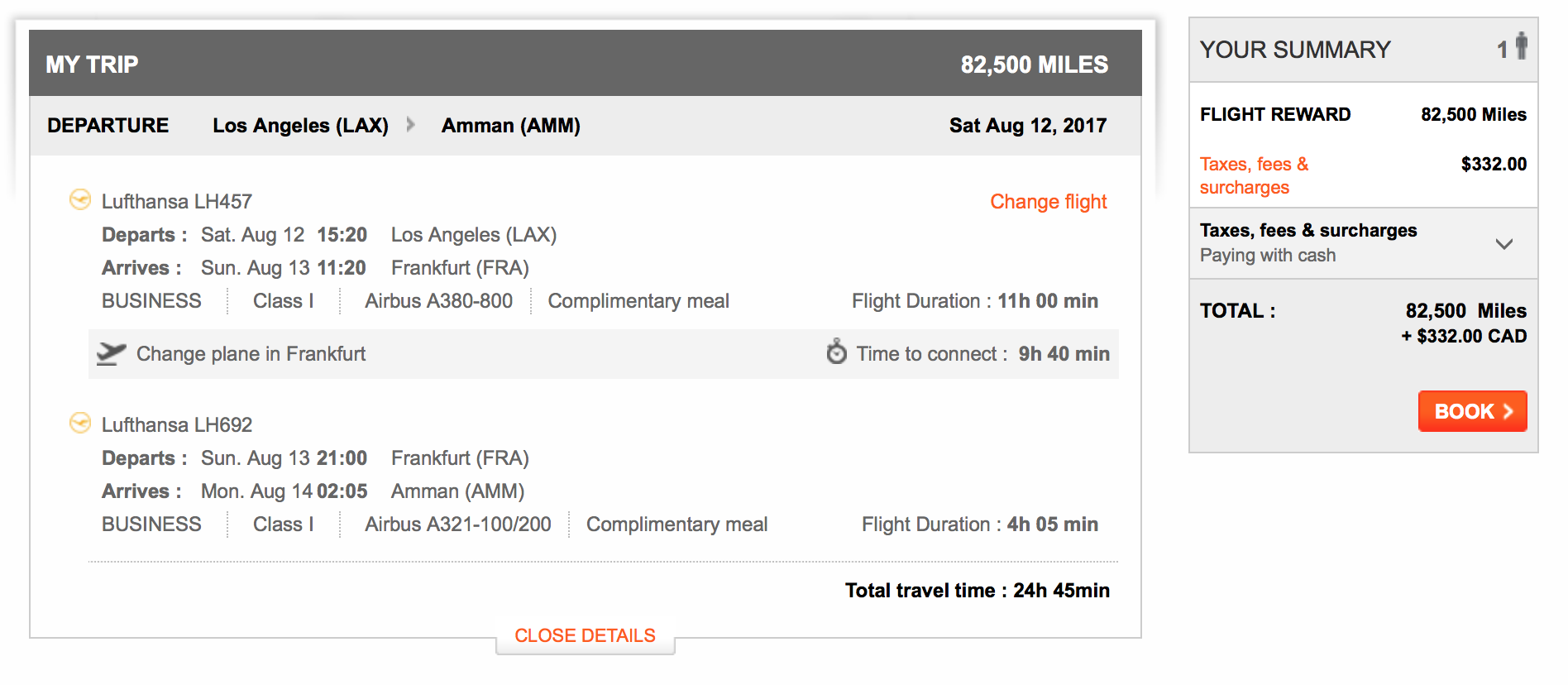
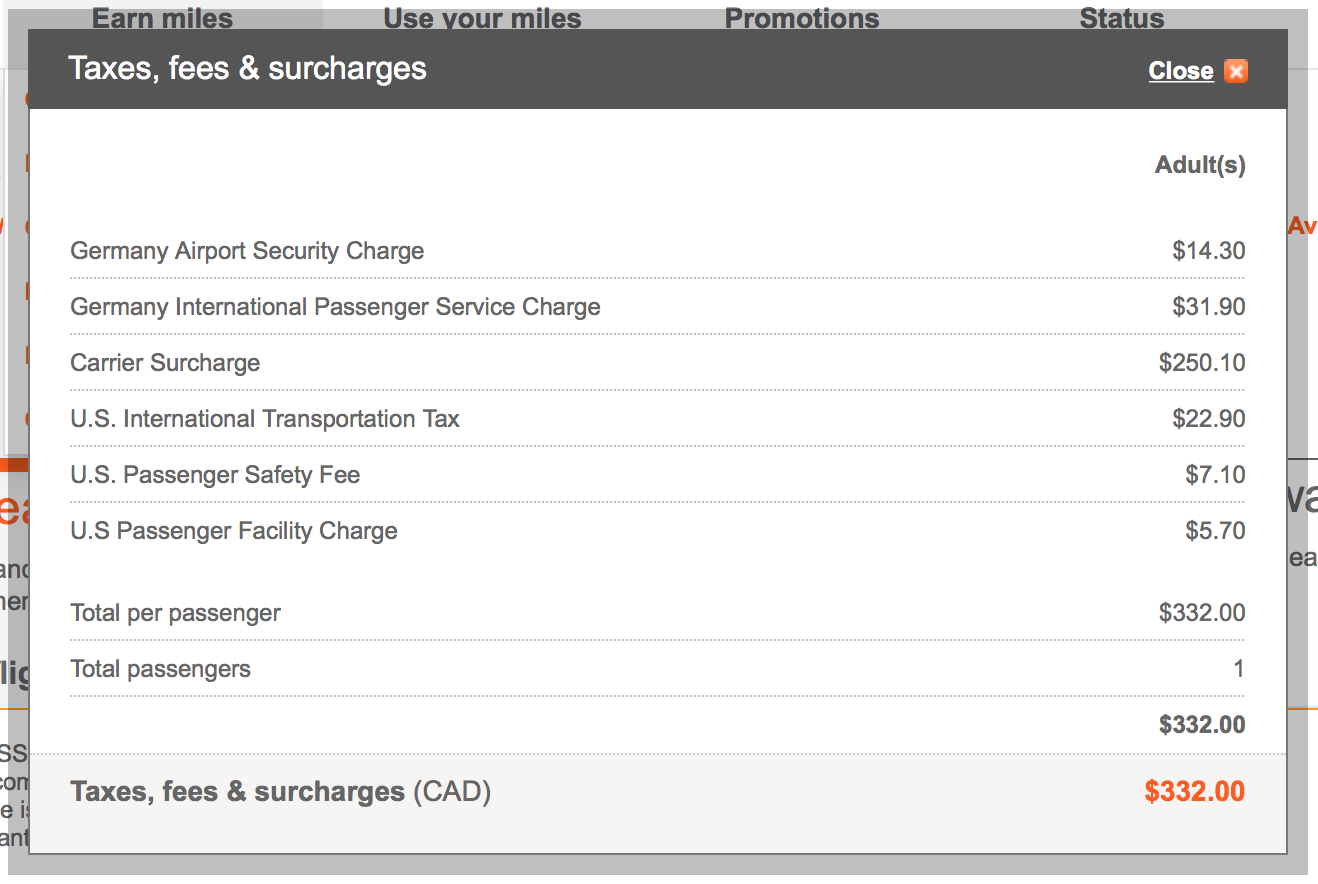
How does an extra flight, which burns more fuel and incurs additional expenses, have the effect of greatly reducing out-of-pocket expense?
Here’s the answer: because the fees are a sham.
And it’s not just this city pair, by the way. I could point to dozens, probably hundreds, of additional examples:

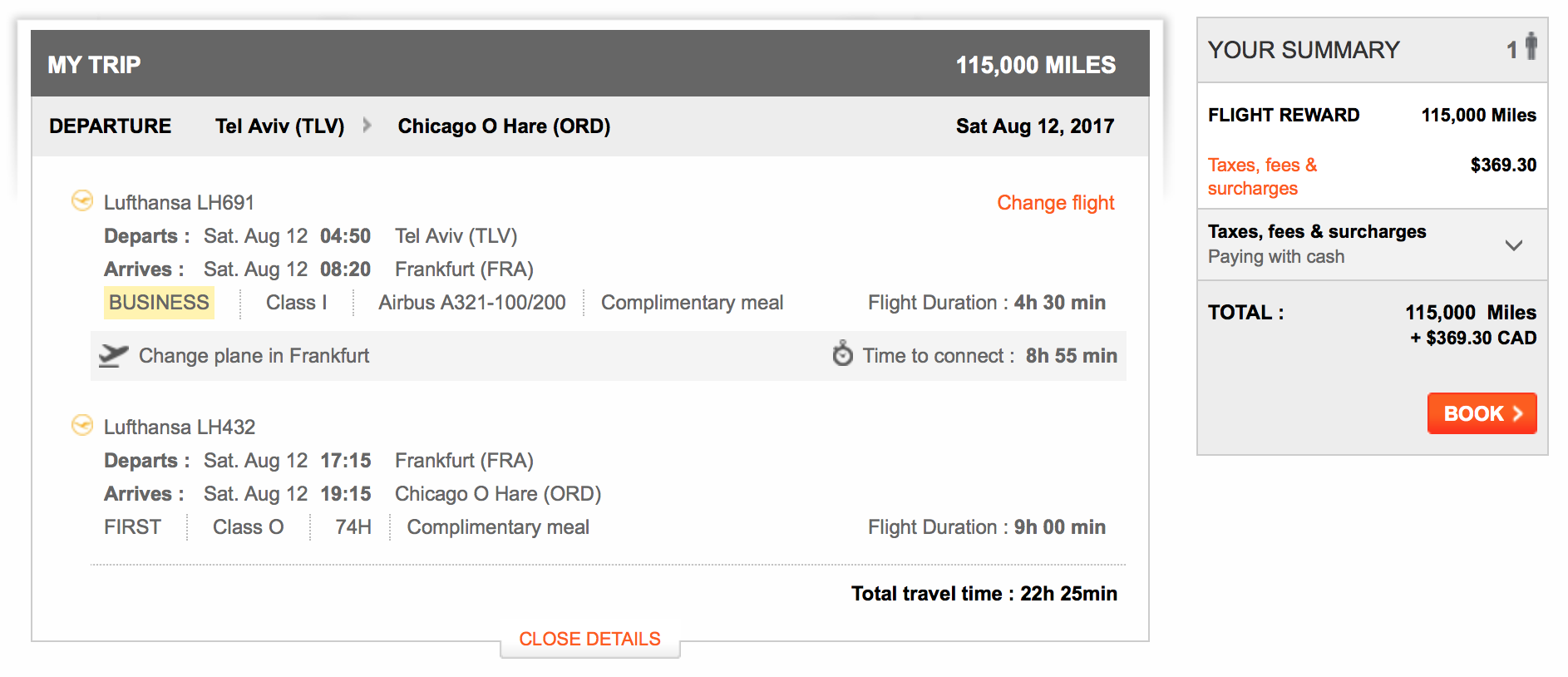
CONCLUSION
I’m not calling for regulation, per se. I’m in favor of “letting the market work”. But I do believe so-called “carrier imposed fee” are objectively unethical.
View from the Wing also offers a helpful discussion on this topic.

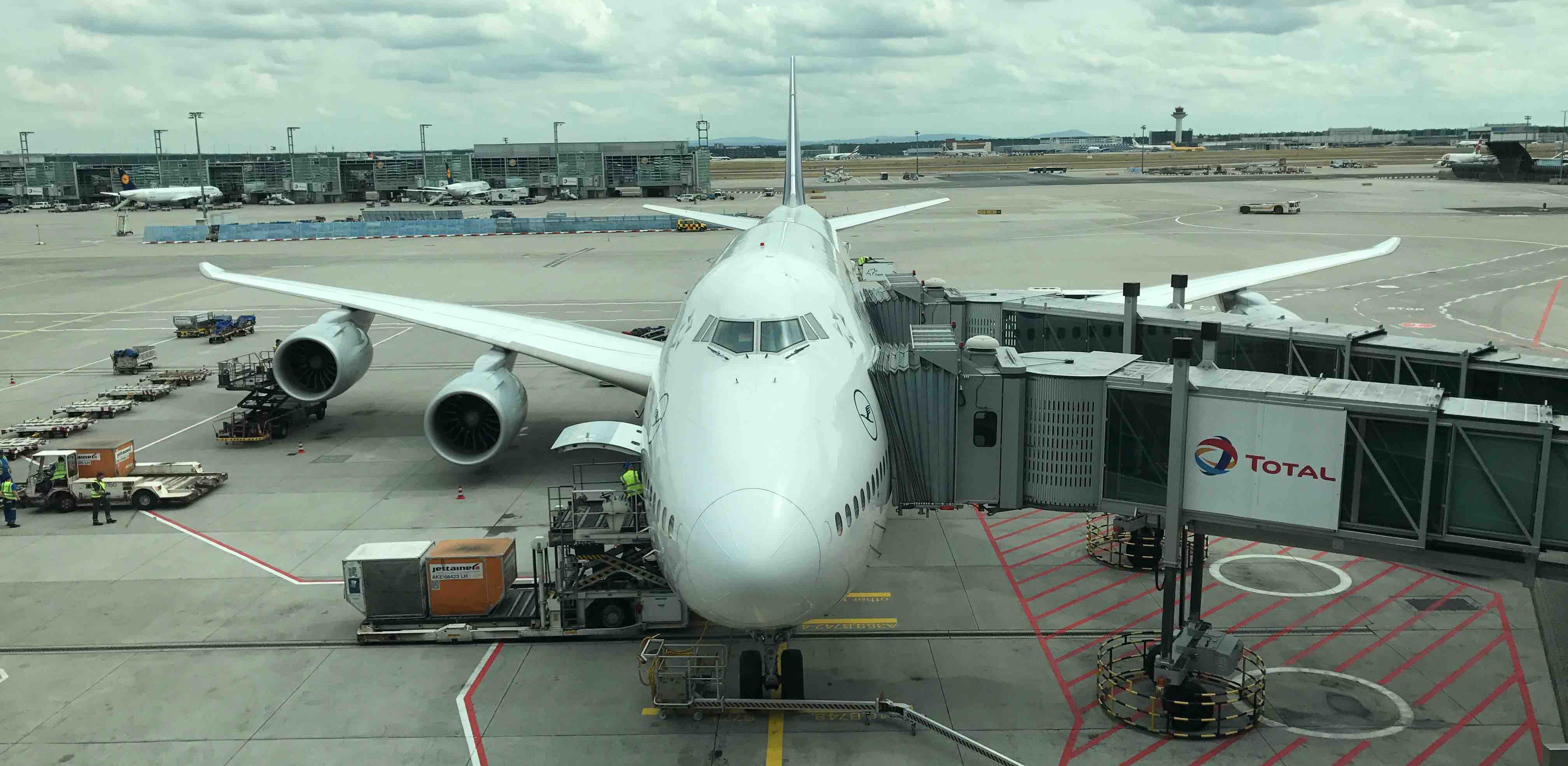



seems like the tsa fee on every passenger, times the number that pass though check points would mean tsa is operating at a profit.
“Letting the market work” would entail customers avoiding programs that have surcharges. This already happens to some extent, but obviously not enough to make the practice obsolete. However, it’s not a coincidence that as customers are wising-up, some carriers are dropping surcharges. It all starts with customers becoming informed.
this is also one of the best justifications of why UA MP remains one of the most valuable mileage currencies – never ever pass on any of this YQ b.s. over to you when redeeming on any single carrier.
Which also highlights how AA miles are far worse than most people think – bloggers kept touting their EY Apartments, QR QSuites, and wide open CX space, and forgetting that for most Americans (I’d assume comprising a majority of readers of these blogs), US-Europe redemption is very crucial part of their traveling puzzle.
Between BA’s YQ and AA’s non-existent saver space, they’re left with discussing the likes Air Berlin and Finnair.
Well, when the supplier is the monopolist, the market cannot fix the problem. In many cases, you cannot choose your program freely and competitively and you end up with more or less one program.
Totally agree – just recently asked BA reservation agent to explain the fees to me; she came back with no answer after some internal digging, and suggested to talk with BA relations department.
These fees are so ridiculous! It is one thing that I really dislike about aeroplan. As much as I prefer flying AC over UA when flying from YYZ to the U.S. or even to Europe I often pick UA when using aeroplan points just to avoid the ridiculous fees aeroplan charges when travelling Air Canada. So ironic you are charged so many fees flying AC when aeroplan is their frequent flyer program. At least I can sometimes pick LX over UA to fly to Europe since they at least have none of these fees either.
Well, they (airlines) worked hard to justify any cost and fees they can imposed to the customer. As long as the regulator ain’t complaining and the customer keep paying, why take it out? Money is like party attendance, the more the merrier.
Well, as much as I dislike paying those fees, either for an award ticket or for a ticket purchased with money, I believe the airlines are and should be free to set whatever price they want. And I, the customer, am also free to decide paying that price or not.
When looking at the award ticket fees we should also look at the number of miles we’re paying, at the availability and at the change/cancellation fees.
For example, I live in Boston and if I want to travel to Europe I can find excellent availability and connections when flying AirFrance. The price for a one-way in business class is 62.5k miles (45k if on sale) and about $250 in fees. Cancellations or changes are a very reasonable $50. When booking using United’s MileagePlus program, the price is about 70k miles about $100 in fees. To cancel or change, the fee is between $75 and $125, depending on whether this is done two months before the flight or not. The availability is often problematic, or sometimes United offers a carrier I’m currently avoiding (Turkish) or the connections are pretty bad (long layovers, inconvenient departure times etc). So is United better than AirFrance, when all is said and done? Not necessarily.
well this is the “travel cycle” so lets make the most out of it, people are not going to quibble over a couple of $100s, when most everybody is traveling somewhere in this economy cycle.
For hotels, resort fee is their carrier imposed charge, the 48-72 hr cancellations are their close-in period. you get the idea.
It’s difficult to let the so-called “market” work it out when the industry is a government blessed oligopoly.
Matthew… I recently booked a flight that mistakenly omitted the YR surcharge. The airline caught it 4 days later and cancelled the ticket. Any shot of trying to fight this??
More details please. What routing?
Sorry, never got a notification on your reply.
Jfk-nbo sale on October 28th. New route on kenya airlines found through delta website. Paid 480 for 2 people, confirmed on both kenya air and delta. Ticket #s and the whole lot. 4 days later recieved an email stating it was an unauthorized booking because it was missing the YR surcharge. I’ve since been refunded and am obviously aggravated that an error on the website has resulted in the loss of my ticket.
That’s horrible. The $480 price showed throughout the booking process on Delta.com?
Is it possible for you to forward me the email from Delta? Did you use a real email address when leaving a comment?
Yes, through delta.com yes that’s my real email address. Have screen shots of the final screen with the total but didnt think to take pictures of everything along the way, didnt think I would have this problem 🙁